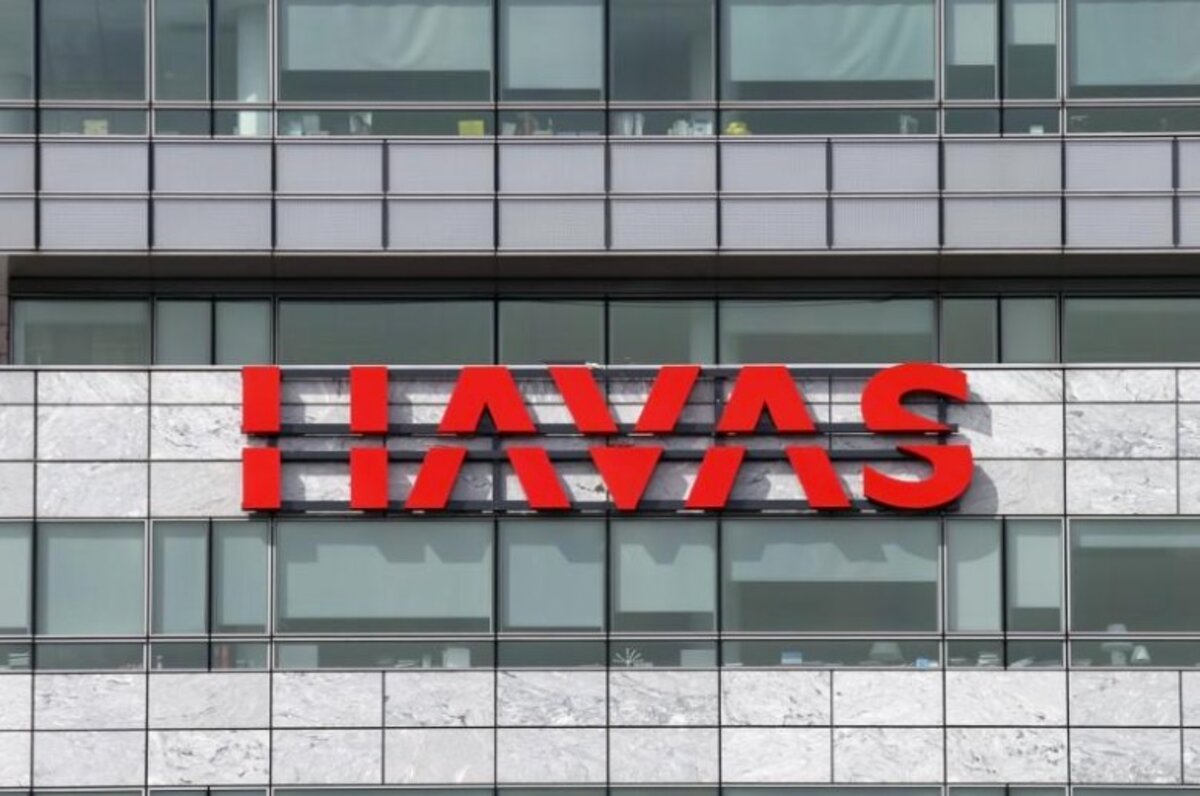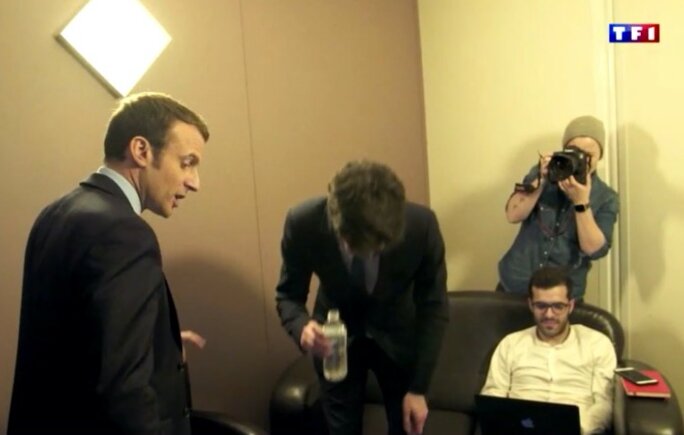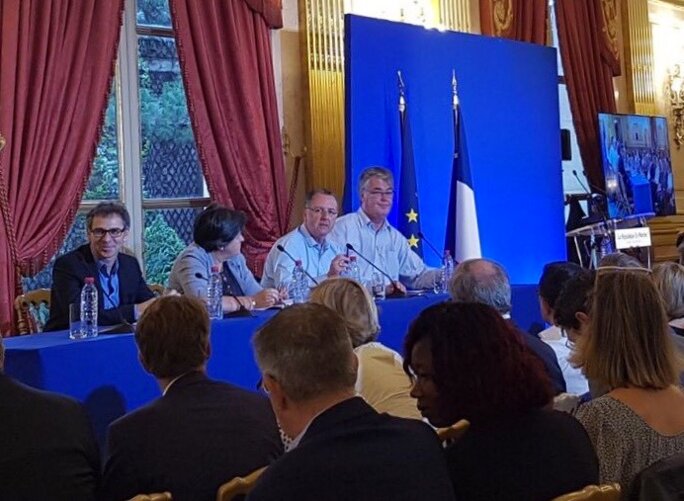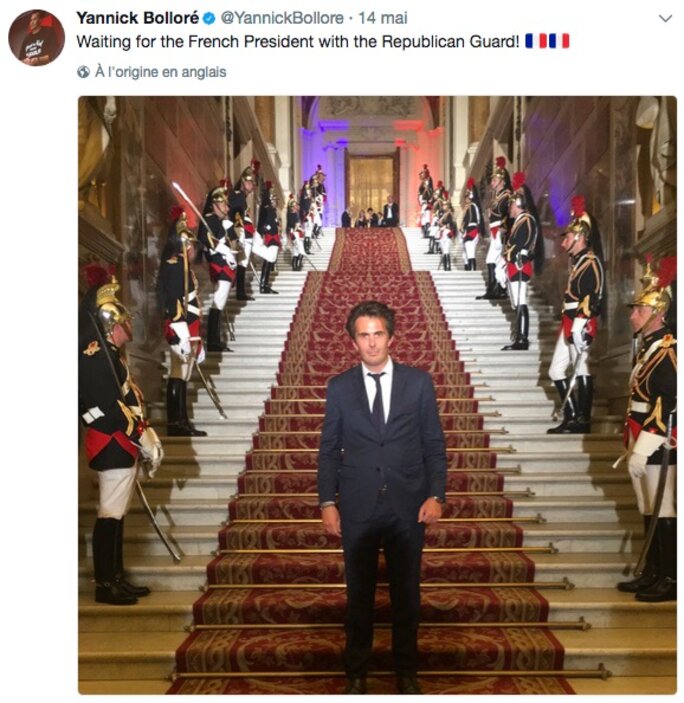Its name invariably pops up at the heart of major political events in France. Even when it was placed at a relative distance during the 2012-2017 presidency of François Hollande who, according to French journalists Aurore Gorius and Michaël Moreau in their book Les Gourous de la com’ (“The communications gurus”) held it in “manifest detestation”, it continued to maintain its presence within the machine of government.
“It” is Havas Worldwide (formerly Euro-RSCG), the communications, marketing and advertising giant owned by French billionaire businessman Vincent Bolloré, and whose vice-president is Stéphane Fouks, the PR advisor who took charge of the damage limitation communications strategy of former IMF chief Dominique Strauss-Kahn after his arrest in 2011 for an alleged sexual attack on a New York hotel worker.
Fouks played the same role for his friend and former French budget minister Jérôme Cahuzac, when Mediapart revealed in December 2012 how he had dodged taxes in France via a secret foreign bank account. Cahuzac, after initially denying the tax evasion, eventually confessed to the scam which ended his political career.
The influence Havas wielded within the French government under Hollande’s presidency included its relationship with Emmanuel Macron, who was economy minister from 2014-2016. The then-junior minister for digital affairs, Axelle Lemaire, whose department came under the umbrella of the economy and finance ministry, described how she found herself surrounded by a mostly male team of 30- and 40-somethings she scathingly dubbed “the Havas Boys”.

Enlargement : Illustration 1

Among these was Ismaël Emelien, who today is a special advisor to President Macron. A senior consultant between 2009 and 2013 of what was then Euro RSCG (it was renamed Havas Worldwide in 2012), he joined Macron’s ministerial team when the latter was appointed economy minister in August 2014. Emelien, who first met Macron in 2009, was placed in charge of communications and speechwriting, working alongside Anne Descamps who was in the same year as he at the Paris political sciences school Sciences-Po, where the two gained master degrees in public affairs in 2010. Descamps had also previously worked under Stéphane Fouks at Havas, where for four years, according to Les Gourous de la com’, “she worked on the lobbying for electronic cigarettes, and also for [French-Israeli billionaire businessman] Patrick Drahi during the takeover of [French mobile phone and internet service provider] SFR, a very sensitive case for the economy ministry”.
Anne Descamps is now head of communications for Macron’s new centrist political party, La République en Marche (LREM). According to online magazine L’Opinion, she is one of the “brains” behind the party’s project to partly shape itself as “a media” organisation, publishing online video reports about local activities and serving as an information hub for its militants. Meanwhile, Ismaël Emelien, now the president's special advisor, is part of what French daily Le Monde last month described in a headline as “this trio that governs France” (the other two being Macron and his Elysée Palace secretary general Alexis Kohler).
This 30-year-old principal strategist, known for his discretion and wariness with regard to the press, most often seen studying a computer behind large-frame spectacles, stays well clear of the spotlight and when he does speak with journalists he demands that he is never directly quoted. His domestic partner, Hélène Ribault also worked at Havas, where she became manager of public relations in 2010 before heading up the group’s branch that organises events for VIPs, Private by Havas Event.

Enlargement : Illustration 2

When Emmanuel Macron stood down from government in August 2016 to officially present his presidential election bid, Emelien had already left the economy ministry several months earlier to help with the launching of Macron’s “movement”, then called En Marche !. He and Macron, beginning one year before the elections, used the tricks of traditional communications to present Macron’s maverick candidature as a natural, almost obvious, move.
Emelien had already gained some experience in election campaigns, having interrupted his studies at Sciences-Po in 2006 when, aged 19, he joined the campaign staff of Dominique Strauss-Kahn in the latter’s attempt to win the Socialist Party primaries to become its candidate in the 2007 presidential elections. In the event, Strauss-Kahn was beaten by Ségolène Royal. “He wrote up information reference cards,” recalled Benjamin Griveaux, now a junior minister with the Ministry of Economy and Finance and a former spokesman for Macron’s En Marche ! movement, who also worked on Strauss-Kahn’s 2006 bid. A number of other Macron aides had worked for Strauss-Kahn, including Cédric O, who is now an advisor to the president and prime minister on the digital economy, and also Stanislas Guerini, elected in June as a Member of Parliament (MP) for Macron’s LREM party, for which he is the official spokesman in the lower house, the National Assembly.
Meanwhile, Gilles Finchelstein, head of the Fondation Jean-Jaurès, a political think tank close to the Socialist Party, is another “Havas boy” who was close to Strauss-Kahn. Director of Studies at Havas under Stéphane Fouks, Finchelstein recruited Ismaël Emelien for the agency in 2009. The two worked closely together, including when Emelien joined Macron at the economy ministry in 2014. According to Aurore Gorius and Michaël Moreau in their book Les Gourous de la com’, Finchelstein like to joke that, “He wrote everything, I re-read it”.
Part of the job of the communications team at Havas is to advise on PR and political strategy to French and foreign politicians, services that are heavily billed. In 2013, Emelien found himself working as part of the Havas communications team for the presidential election campaign of Nicolás Maduro, the current and contested strongman leader of Venezuela who succeeded Hugo Chavez. “I went to Venezuela twice for three days,” Emelien told Mediapart. “I spent one day per week on that mission for three months.” Gilles Finchelstein detailed the contract: “It involved a complete service, with the making of ads, a documentary, the organization and conception of meetings, social media [content], and advising. Nicolás Maduro was presented then as the Venezuelan Lula, a pragmatic person, the unionised branch of Chavism.” Finchelstein said he had travelled to Caracas “six or eight times” for the mission given to Havas, while its vice-president Stéphane Fouks went to Venezuela “two times”. In the event, Maduro was narrowly elected on April 14th 2013, with just a 50.6% share of the vote. The Chavist movement later claimed the communications operation had been overly a marketing exercise.
Musical chairs
Gilles Finchelstein, who was hired for his services by the French economy ministry when Pierre Moscovici, now EU commissioner for economic and financial affairs, was its minister (between 2012- 2014), told Aurore Gorius and Michaël Moreau that he had not wished to work with Havas clients on Macron's 2015 economic reform bill because of his close relations with Moscovici. “If there was ever a project which I wouldn’t have touched with my little finger, it’s that one,” he told them. But that did not stop him from co-signing an open letter by business leaders and academics, published in the weekly JDD, imploring MPs to support the bill, which aimed to bring a degree of deregulation to the labour market and sectors of economic activity, just before its passage through parliament. The then prime minister, Manuel Valls, fearing it would not find majority support after a revolt by a section of Socialist Party MPs, eventually forced its adoption into law by using the constitution's Article 49.3, which allows governments to bypass a parliamentary vote.
Although two-thirds of his professional activity is with Havas, Finchelstein insists that his public activity is limited to his position as president of the Fondation Jean-Jaurès. In January 2016, as Macron was preparing his presidential bid, Finchelstein, interviewed by national radio station France Inter, announced “I very much like Emmanuel Macron”, without mentioning that, from afar, he was offering advice to the future president. Following this year’s legislative elections, when Macron’s LREM party won a significant parliamentary majority, Finchelstein was a guest of honour at a June "seminar" of LREM MPs.

Enlargement : Illustration 3

Emmanuel Macron’s candidature in the presidential elections appeared to have the support of the Havas senior management. During Macron’s first appearance at an En March ! meeting, held on July 12th 2016 in Paris just weeks before he would officially announce his bid, Yannick Bolloré, son of Havas owner Vincent Bolloré, and CEO of Havas France, was present. He was also among those attending Macron’s investiture as president on May 14th this year, when he posted a photo of himself at the official ceremony on his Twitter account (see below right).

Meanwhile, Stéphane Fouks leant his enthusiastic support to Macron’s controversial strategy towards the media, strictly controlling its access to official events and, with regard to his predecessors, reducing interview opportunities. “When you show everything, you abandon editorialisation [sic] to the media who decide what they will show of you,” he told L’Opinion. “You are then no longer master of yourself. The process of marketing is to help the client give best place to what are his plusses, and to make them desirable.”
Returning to the subject at the end of August in an interview with French daily Le Parisien, after a summer of PR gaffes by the new president, Fouks said: “In the space of two months he has managed to produce a dozen images of his [political] action which remain engraved in people’s memory. The evening [election victory celebrations] at the Louvre, travelling up the Champs-Elysées in an armoured vehicle, the handshake with Trump, his presence onboard a nuclear submarine, and so on […] He has to put his action into perspective, to give it a sense. As much as it’s not necessary to lose oneself with off-the-record conversations with journalists [Editor’s note: for which François Hollande came in for much criticism, notably over a book by Le Monde journalists], for as much it is necessary to have a dialogue with journalists to engage in pedagogy about his action. I think that the moment will come.”
On September 1st, Macron appointed political commentator Bruno Roger-Petit as his presidential spokesman. Before taking up the job, Roger-Petit was not shy to echo the Havas communications line in the columns of the press publications which employed him. That was also true with regard to Dominique Strauss-Kahn, to whom, according to French weekly Marianne , he even proposed his services, and more notably so during the scandal surrounding budget minister Jerôme Cahuzac, who he continued to vehemently defend even after Cahuzac finally confessed to holding a foreign bank account as revealed by Mediapart.
Several former Havas staff hold key positions in Macron’s government. Véronique Le Goff, who is now communications and press relations advisor to foreign minister Jean-Yves Le Drian, worked nine years with Euro RSCG. Catherine Doumid, a former associate director of Havas Worldwide, occupies the same position with the junior minister for public accounts, Gérald Darmanin. “There are always people who worked for Havas, but it’s less tentacular than before,” she told Mediapart.
In an interview with Aurore Gorius and Michaël Moreau published in their book Les Gourous de la com’, Stéphane Fouks payed down the suggestion that he had become a persona non grata at the Elyséee Palace during the presidency of François Hollande, underlining that Havas Paris had won the tender to manage the communications of Creative France, a campaign launched by Business France, the public agency for the promotion of French businesses abroad. He noted that the contract to manage the campaign could have been vetoed by Hollande if he was so inclined. The 8-million-euro contract is now the subject of a preliminary investigation by the Paris public prosecutor’s office into suspected “favouritism and receiving the proceeds of favouritism” by persons (as yet) unknown. Business France was at the time headed by Macron’s labour minister, Muriel Pénicaud.
The investigation centres on the conditions in which an evening reception was organised in Las Vagas on January 6th 2016, which was held to promote French digital start-up firms, when the guest of honour was the then French economy minister, Emmanuel Macron. As revealed by weekly publication JDD and daily Libération, the event was organised in a rush by Business France and without any call for tenders as required by law. But if Business France found itself caught in the middle between Macron’s ministerial cabinet and Havas, some would see no surprise in this given how the actors of both are so familiar with each other.
-------------------------
This article includes extracts from "Macron & Cie, enquête sur le nouveau président de la République", a book by Mediapart political correspondent Mathieu Magnaudeix, with additional reporting by Mediapart's editorial team, which is published this week (in French) by Don Quichotte, priced 19.9 euros.
- The French version of this article can be found here.
English version by Graham Tearse


